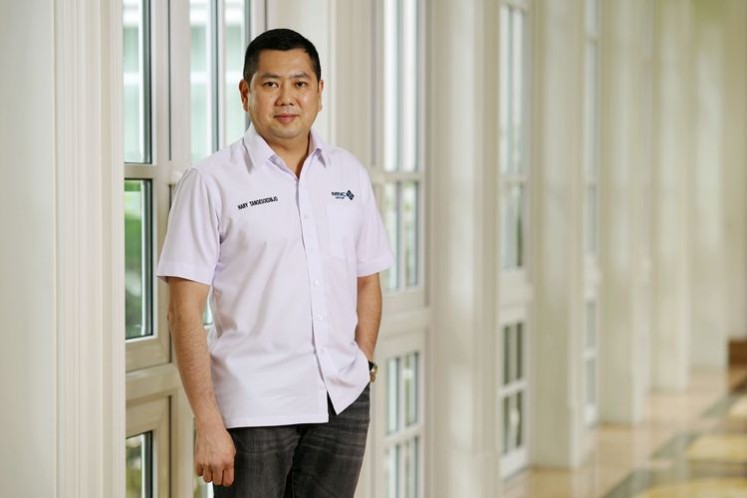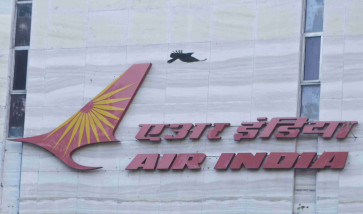Popular Reads
Top Results
Can't find what you're looking for?
View all search resultsPopular Reads
Top Results
Can't find what you're looking for?
View all search resultsTycoon-backed digital banks here to stay
Business conglomerates pivot to online banking mostly through acquisitions.
Change text size
Gift Premium Articles
to Anyone
B
usiness conglomerates and some of the richest individuals in the country have been flocking to invest in digital banking as consumers rapidly adopted online services during the COVID-19 pandemic.
Bank Indonesia (BI) estimates that digital banking transactions grew 19.1 percent to Rp 32.2 quadrillion (US$2.25 trillion) last year, much faster than the 1.5 percent increase logged in 2020.
Last year, at least seven firms deemed themselves digital banks, while seven more were waiting for their Financial Services Authority (OJK) license to offer digital banking services.
“I believe this trend is largely driven by conglomerates in the banking industry that allocate their capital in a pivot to digital banking,” University of Indonesia economist Fithra Faisal told The Jakarta Post on Monday.
Indonesia has at least seven tycoons with major ownership in domestic banks offering digital services, ranging from well-established Bank Central Asia (BCA) – with its BCA Digital subsidiary – to small, new firms like Allo Bank.
PT Mega Corpora, owned by tycoon Chairul Tanjung, became the largest stakeholder in digital lender Allo Bank, after acquiring the bank last year, when it was named Bank Harda Internasional.
Diversified conglomerate Salim Group, according to recent reports, is set to acquire a stake in Allo Bank through a rights issue to make it the fifth-largest stakeholder in the bank.
Read also: Bukalapak, Salim Group to buy into digital lender Allo Bank
Aside from a major share in Allo Bank, Salim Group head Anthoni Salim also has Bank Ina Perdana (BINA) under his portfolio. BINA’s shares skyrocketed in July after the company announced a rights issue prior to transforming into a digital bank.
BCA launched BCA Digital in July last year. Previously called Bank Royal, the lender was acquired by BCA in 2019 for Rp 988 billion and later turned into BCA’s digital banking arm.
BCA, Indonesia’s biggest private lender, is owned by two of Indonesia’s richest people, brothers Budi and Michael Hartono.
A string of small bank acquisitions began in 2020 when veteran banker and billionaire Jerry Ng acquired a majority share in Bank Artos Indonesia, now named Bank Jago, through his company PT Metamorfosis Ekosistem Indonesia.
“Jerry Ng became one of the richest persons in the country due to Bank Jago,” Fithra said. “One of the reasons Bank Jago was able to book a profit was because of the digital banking hype.”
He went on to say that bank digitalization had caused a “bandwagon effect” in the last couple of years, in which conventional banks had been rebranding themselves as digital banks.
Read also: Small banks’ shares surge on consolidation, digital bank boost
Emtek Group acquired 93 percent of Bank Fama International last year to develop digital banking services and increase its foothold in the wider digital economy. The group, headed by cofounder Eddy Kusnadi Sariaatmadja, also holds majority stakes in e-wallet DANA and e-commerce platform Bukalapak.
Meanwhile, Mochtar Riady, head of Lippo Group, holds 22.5 percent in Bank Nationalnobu, or Nobu Bank, through his company PT Kharisma Buana Nusantara.
Nobu Bank launched its digital banking app NOBUNeo in August last year, followed by an announcement in September that the bank would move further in its digital transformation.
Conglomerate MNC Group also tapped into digital banking after Bank MNC Internasional (BABP) received the OJK’s digital banking permit last year. Its digital banking arm, MotionBanking, would offer online credit card applications, among other services.
The business activities of MNC Group chairman and politician Hary Tanoesoedibjo span from television and radio to real estate.
Group Chairman and CEO MNC Group Hary Tanoesoedibjo. (Bloomberg/File)“I believe the digital banking hype will remain for five years to come,” Fithra said, adding that he expected the banking ecosystem to be dominated by the same tycoons in the next two years, as the barrier to entry in the industry was high.
However, Fithra also said fintech start-ups were on a trajectory to become digital banks and when they do, fintech would be the biggest competitor to current digital banks.
“These banks are not temporary, hit-and-run projects. Digital banks will be a long-term portfolio for [the tycoons], and it is just starting,” LBP Institute market analyst Lucky Bayu Purnomo told the Post on Tuesday.
He said bankers were drawn to digital banking because establishing a presence in that segment – as opposed to the whole range of banking services – required less capital, and the application of technology lowered operating costs.
Technology stocks being the biggest gainers on the Indonesia Stock Exchange (IDX) last year created sentiment that could see digital companies also thrive in 2022, Lucky added.
Read also: Tech industry buoys Indonesia Stock Exchange in 2021
“When all banks are going digital, investors should look out for companies that can put technology to good use, reduce cost and gain high profit,” Lucky said.
He added that Bank MNC International, Allo Bank and Bank Jago were among the top digital banks that showed promising potential as they were backed by big names MNC Group, CT Corp and GoTo Group, respectively.











